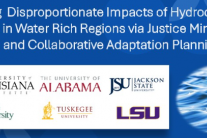On Friday, April 4th, the University of Louisiana at Lafayette hosted its Annual NSF EPSCoR Project Meeting for the
UL Lafayette Leads Multi-University Research on Flood Mitigation and Response
Tue, 04/08/2025 - 9:44amMulti-state research project aims to help Gulf Coast communities prepare for, respond to floods
The solution to helping Gulf Coast communities prepare for and respond to floods and other climate extremes isn't going to be found in one discipline alone.
That's why organizers said the $5.8-million, six-university impact research project led by the University of Louisiana at Lafayette is vital. Its goal is to bring together experts from various fields who can bring solutions to communities in Louisiana, Mississippi and Alabama.
"All of our communities across the Gulf Coast struggle with and need better science, better research, better tools and data on how to handle these emerging and continuously evolving flood risks and hazards," said Emad Habib, a hydrologists and director of the Louisiana Watershed Flood Center and the Institute for Coastal and Water Research.
UL on Friday brought together more than 30 faculty members, researchers and students from the university, LSU, Tulane University, Jackson State University in Mississippi, the University of Alabama and Tuskegee University.
Their backgrounds varied from hydrologists, engineers, climate experts, historians, planners to economists with each person having a different perspective on flood risks and possible solutions.
Participants said in an ice-breaker activity that they were most excited about working with other scientists, seeing others' approaches to issues, experimenting in a low-pressure environment, modeling and simulations and publishing research papers.
The project's collaborators don't just include academics. It involves community partners and decisions makers, such as local governments and disaster response agencies, who can help inform research and practice how tools might help them in actual scenarios.
Those partnerships are how "research meets practices," said Ramesh Kolluru, UL vice president of research, innovation and economic development.
"They are the ones involved in building infrastructure, they are the ones that are involved in planning infrastructure, they are the ones that are involved in reacting to and recovering from disasters," he said.
Bringing university and community partners together from three different states is important because all of the participants and their Gulf Coast communities share the same experience: water is both a resource and a vulnerability when it's not well managed, Kolluru said.
"Managing the water and the watershed as a resource becomes extraordinarily vital," he said. "It translates to our economy, it translates to our way of life and it translates to our community security.
Habib said the project, funded by the National Science Foundation's Established Program to Stimulate Competitive Research, also will rely on input and engagement from the community.
"We walk into this project with a very humble attitude," he said. "We don't claim to know all the answers and we look forward to (the public) informing our research."
Link - https://www.theadvocate.com/acadiana/news/education/louisiana-alabama-mi...

